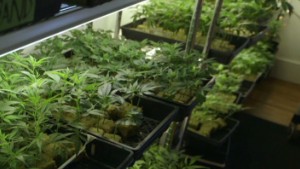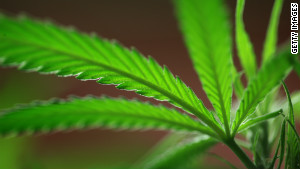Editor's note: Adrian Grenier is an actor, director and producer best known for his role in the Emmy-nominated HBO series, "Entourage." He produced a documentary film "How To Make Money Selling Drugs," available on cable's On Demand and iTunes. It opens in select theaters on June 26. Sunday night at 10 ET, watch the CNN Original series "Inside Man," hosted and produced by documentary filmmaker Morgan Spurlock, which profiles the medical marijuana industry.
(CNN) -- What comes to mind when you think of someone who sells drugs? Maybe it's the shady character luring customers on a corner in a 1980s "Just Say No" ad. Or perhaps you think of the guy from your college with scales in his dorm room, measuring out marijuana to sell to his buddies.
If you're the type who thinks the difference between "legal" and "illegal" drugs is arbitrary, you might even think of your local bartender or pharmacist as a dealer.
Whatever it is, chances are the image will be shaped by some degree of moral judgment and fear stoked by our country's more than four decades of waging a failed drug war.
 Adrian Grenier
Adrian Grenier My motivation for producing the documentary "How to Make Money Selling Drugs" was to examine the hypocrisy of the war on drugs. Billions of dollars are wasted targeting, arresting and imprisoning mostly poor people and minority groups, when rates of drug use are about the same across racial lines.
One study by Duke University found that young black people are arrested for drug crimes 10 times as often young whites, even though they use illegal drugs less often.
Equally baffling is that most of us have taken some sort of substance to alter our mood -- be it coffee, nicotine, Ritalin, a cocktail or a joint -- yet we are conditioned to think that people who use and sell certain drugs are not like us.
The war on drugs fuels corruption and violence. With roughly half a million people behind bars in the U.S. for nonviolent drug offenses, drugs are as plentiful and widely used as ever. Yet, people who want treatment can often expect to endure an obstacle course just to get help.
 'Inside Man' looks at medical marijuana
'Inside Man' looks at medical marijuana  Flood of applicants for 'pot czar'
Flood of applicants for 'pot czar'  Medical marijuana for a 7-year-old?
Medical marijuana for a 7-year-old? Through the process of working on this film, realized I could relate to the subject in many ways. I have loved ones who are users and some who are sellers. From growing up on the Upper West Side of Manhattan in the 1980s, to going to Hollywood, to the brownstone neighborhood where I live in Brooklyn, I've always been in some proximity to drugs and the drug trade. Drugs are all around and nearly impossible to avoid.
There is a devastating toll that comes with losing control of drug use. People I care for deeply suffered serious harm, whether with legal products like alcohol or with illegal drugs that carry the threat of incarceration along with addiction.
The close family members who were in the business of selling drugs, far from being violent or malicious, were selling drugs in imperfect circumstances and out of economic necessity. They are not the kind of criminals our policies make them out to be. They are humane, peaceful and caring members of my community, who have been a positive influence on me and have guided me to find success. Without them, who knows where I would be, if I would have been as lucky.
Read: A father's plea to end the war on drugs
The reality is complicated. This is what makes the story of drugs in our society so compelling. Our political leaders and law enforcement have built up a paradigm of war and fear. Meanwhile, the target of the war is something that is close to, and even arguably part of, every one of us.
As an adult, I moved to a Brooklyn neighborhood where the contractor who worked on my house was afraid to park his car. He asked if I wanted to put bars on my window. Even I found myself looking at the guys on the corner, probably selling drugs, with a certain amount of suspicion.
But the weird thing is I got to know a few of them and they are human beings with interesting personalities, feelings, and loved ones. In the grand scheme, these low-level sellers are small fries and don't belong in prison.
"How to Make Money Selling Drugs" reveals that the real big bucks are made in the law enforcement, drug testing and prison industries. Each year, the U.S. spends more than $51 billion on the local, state and federal level to fund the drug war. This money would be well spent if it effectively protected public safety and health --- but instead it has dismantled families and communities, while reinforcing violence, overdose and illness.
Fortunately, the public is growing more aware. A majority of Americans believe the drug war has failed and support reforms such as decriminalization of marijuana, according to the Pew Research Center.
There is also a growing number of prominent leaders from across the political spectrum, including the presidents of Colombia, Guatemala and Uruguay and former Mexican president, and organizations like the Drug Policy Alliance, promoting alternative approaches rooted in human rights and science.
I want to make clear that I am not looking to glamorize the drug trade. But it is important to understand that little is to be gained from stigma and demonization. It may sound unconventional -- but if we are to truly tackle the question of how to live with drugs -- be they marijuana, alcohol, cocaine, heroin or anything else -- and have the healthiest possible society, we have to look at all sides of the issue.
Our task is to think critically and explore sensible alternatives to drug war policies, which have essentially resulted in a war on regular people who are far from mythical bogeymen.
Watch: The human toll of Mexico's drug war
Follow us on Twitter @CNNOpinion.
Join us on Facebook/CNNOpinion.
{ 0 comments... read them below or add one }
Post a Comment